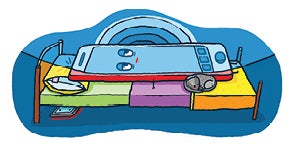You’ve heard it before, but Sue K. Adams, associate professor of human development and family studies, wants to make sure you hear it again: Phones are bad for your sleep.
“According to the Pew Research Center, 95 percent of Americans own cellular phones, 77 percent of them smart phones,” Adams says. “But phones aren’t so smart when it’s time for bed. My research has found that college students sleep only about six hours per night, when they need nine. One of the most commonly cited reasons is FoMO (Fear of Missing Out). A smart phone is like a FoMO generator, disrupting the journey to dreamland with alerts and lost hours checking emails or perusing social.
“Other research has shown physiological reasons smart phones impair sleep: their blue light tricks your brain into thinking it is daytime and suppresses melatonin production; and even with a blue-light filter, phones are an active form of technology, versus watching television, which is passive.
“So shut off email and social media alerts and place the cell phone out of reach—and not at your bedside. Apps such as Offtime, Moment and Flipd can help break the habit.”

 Home
Home Browse
Browse Close
Close Events
Events Maps
Maps Email
Email Brightspace
Brightspace eCampus
eCampus



